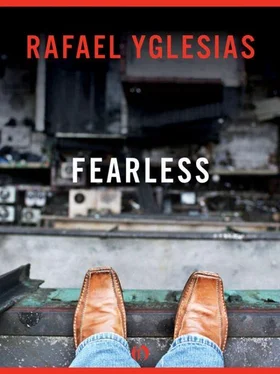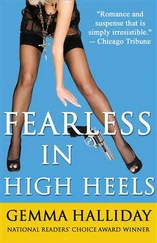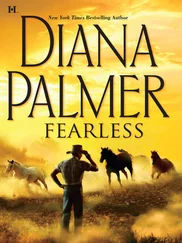Max didn’t answer. He studied his wife to see if the mean truth he had told her had left a mark on her face. She was composed.
“I want you to call somebody,” she said, turning her back on him to hang up the dramatic black cape she wore for a winter coat. She was angry. Everything about her posture and face and tone of voice told him that, but, as had been true since the crash, she was unnaturally holding it in, holding it like a position on the barre. “It doesn’t have to be your psychiatrist,” she said to the closet and then faced Max again. “Maybe you should call Bill Perlman.”
“Bill? You call him Bill?”
“I told you,” she had to swallow to contain her exasperation. “I’ve seen him a few times. He’s helpful to talk to. But it doesn’t have to be him. It can be your mother. Or maybe a friend. You haven’t spoken to Larry or Paul—”
“They’re not real friends.”
“Then who is?” Debby insisted.
Jeff. Jeff was the answer. He was the person Max would have talked to.
“You’re getting worse,” Debby said.
“I talked to somebody,” Max said.
“Who?” Debby asked. Curiosity wrinkled her high forehead.
“You,” Max said. He reached past her and took his coat from the closet. He held it in front of him and looked at her, asking her to give him a reason not to go.
She tried to hold her calm pose. “I can’t help you,” she said but the words were churned up and suddenly she lost her grip on the barre. She yelled: “You tell me you’re in love with a woman you just met! What am I supposed to say to that!” She seemed relieved for a moment and then sagged into despair. “I don’t know what you want from me,” she added in a low note of resignation.
“I’m going to a hotel,” Max said. “Just for tonight. I’ll call you tomorrow afternoon.”
He had checked into the Carlyle. He had fantasized spending the night there since his youth when he learned that it was JFK’s favorite hotel in New York. Later on he read that Kennedy put Jackie in one suite and had his mistress in the adjoining room. That fact didn’t make him less curious.
Max asked for and got a room four floors down from the famous suites in the tower. It was a disappointment. Although the elegant room wasn’t pompous like the Plaza, it wasn’t the good old days either. It had the modern luxury of a video recorder and a CD player. The desk told him a fax machine could be sent up if needed. All that made Max think of business, of what travel had become in the modern world.
He hardly slept, dozing off near dawn and yet waking early. He spent most of the tedious night staring out his window at lights in nearby buildings that stared back at him. All night he waited anxiously to meet Carla.
But he wasn’t happy now that he was with Carla.
They leaned against the rail of the ferry and watched the city first grow bigger and wider as they pulled out into the water. Gradually the huge buildings shrank against the widening water and sky, their tops narrowing into needles lost in the clouds, their foundations revealed as resting on only a thin sliver of support. Manhattan was merely a wafer floating on the steel water. The massive works of the city seemed to be a carefully drawn miniature at the bottom of a huge canvas. He felt himself shrink.
“It is beautiful,” she said wonderingly, as if she had never seen the skyline before.
Max looked at her face, her young skin even tighter as it clenched against the freezing wind. He didn’t have her really. Any more than he had anything. Maybe he was dead after all.
“I had a fight with my wife,” he told her.
“Oh yeah?” Carla smiled. She turned away from the open water. “I had a fight with Manny.” She shivered and squinted at the wind’s force.
“You’re too cold,” Max said. They went inside, bought coffees, and sat on a bench. The hot coffees were in thin Styrofoam cups; holding them hurt. Max burned his tongue on the first sip.
“What did you fight with your wife about?” Carla asked. She was hunched over her coffee, bracing the cup between her knees, warming her hands with its steam.
“I told her I’m in love with you.”
Carla sat up straight and turned to look at him full in the face. Her circular eyebrows raised; up there they made an even rounder shape. “You’re crazy.”
“That’s what she thinks.”
“Well, she’s right. Jesus,” Carla turned away and shook her head.
“It’s what I feel. I’m not going to lie about what I feel.”
“There are some things you’re supposed to lie about,” Carla said energetically, looking at him again. “You gotta stop doing that to people.”
“You want me to start lying to you?” Max argued. “You want me to tell you you’re safe when you go out? You want me to tell you Bubble’s up there looking down at us wearing little wings?”
She slapped his arm with the back of her right hand. “Shut up,” she said casually and shook her head again. “I’m talking about them.” She smiled slyly. “The living.” She nodded at the window, at the water and sloppy landscape of Staten Island. “They can’t take it. You have to give the rest of them a break. I’m as crazy as you are — you can’t go by me.”
“What did you fight with Manny about?” Max edged closer to her until he felt her coat against him, up and down his side. He noticed her ear — it was little and had the ideal shape of a prototype.
“I told him after my mother left I was going to sleep in Bubble’s room. I went in there and started to pack things up. They had kept everything in his room the way it was because they were afraid I would go crazy if they changed anything. And I’m glad they left it so I could do it. I went in yesterday after I saw you and I started packing his little things. I was crying like crazy. But I didn’t mind crying and I was getting it done. My mother goes and hides in the kitchen. She was yelling at me from there. I couldn’t hear what she was saying. Then Manny comes in and tells me to stop. I told him to leave me alone, to leave me alone for good. He said it was your fault. He said you were a bad influence.” She laughed mirthlessly for a moment. “A bad influence. You know, like I’m a teenager and he’s my pop. ‘You’re running around with the wrong crowd,’ ” she imitated a deep, rough-voiced man.
Max smiled. He felt sorry for Manny. Manny had had a wife and a son when he put them on that plane and now both were lost to him. “I am a bad influence from his point of view,” Max said.
“He’s got no right to talk about who’s bad.” She darkened. Her high cheeks and deep-set eyes seemed to become shields; behind them, still visible to Max, she thought something black.
Max was quiet. Staten Island’s dock, a dull brown nest, limited their view. He felt better, vindicated in his feelings toward her. He could say the worst to her and she accepted him. The uneasy feeling he had moments ago — that he had been mistaken about Carla — was gone. “Let’s get in the car,” he said.
This time, when Carla strapped herself in she did it slowly and sadly. “I’m gonna tell you something nobody knows,” she said quietly as they drove off the ferry. Max had studied a map at the Carlyle. He turned right aiming to stay along the water if he could, hoping to find the famous shipyard. He wasn’t sure if the street allowed a view. “Just before the crash,” Carla continued. “Do you remember? We could see the runway. It looked like we were gonna be okay?” Her voice was tremulous, as if she were weeping in her throat. Her eyes were dry. She said shakily, “I let go of Bubble.”
Max had never heard a voice in so much pain. He stopped the car immediately, right after a curve. He parked beside a white seawall, tall enough to block the view of the harbor. He shut off the engine and faced her. Carla was staring ahead, through the windshield. Her hands and arms were out forming a circle, holding something invisible in her lap.
Читать дальше












